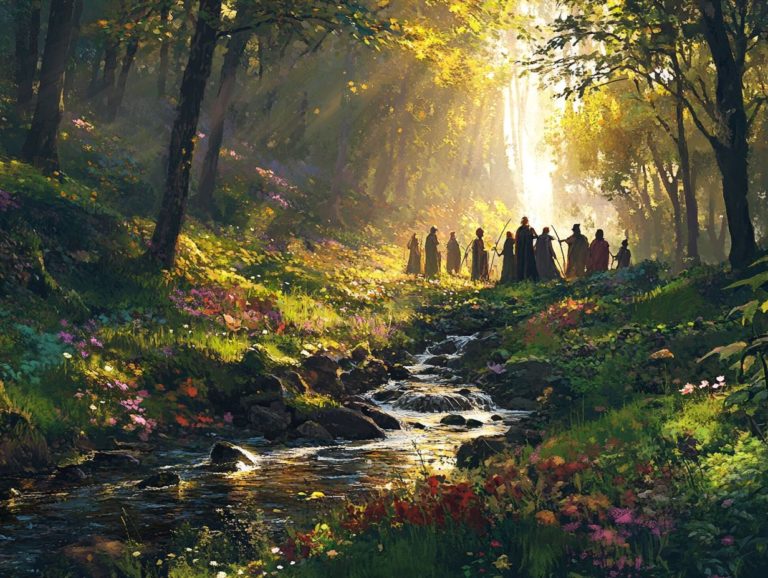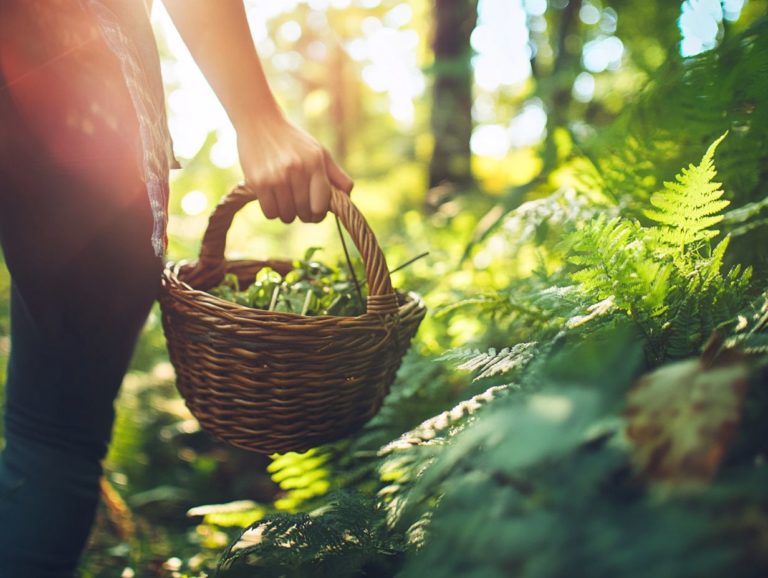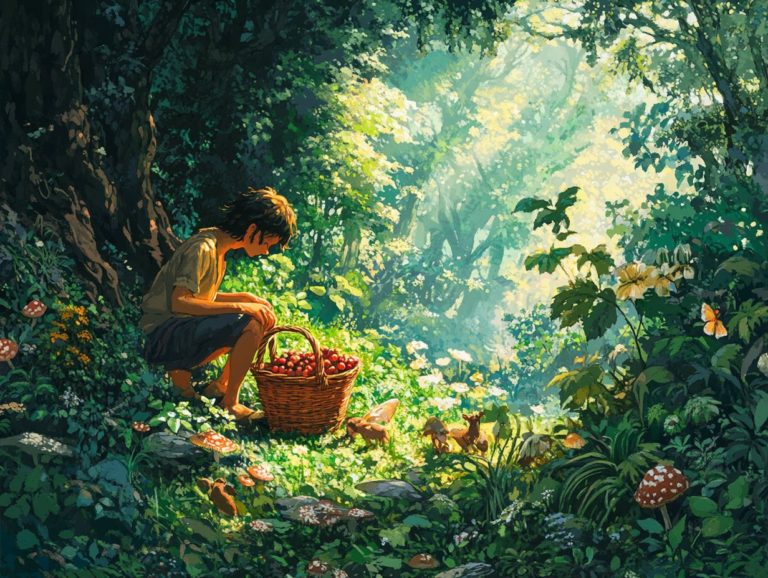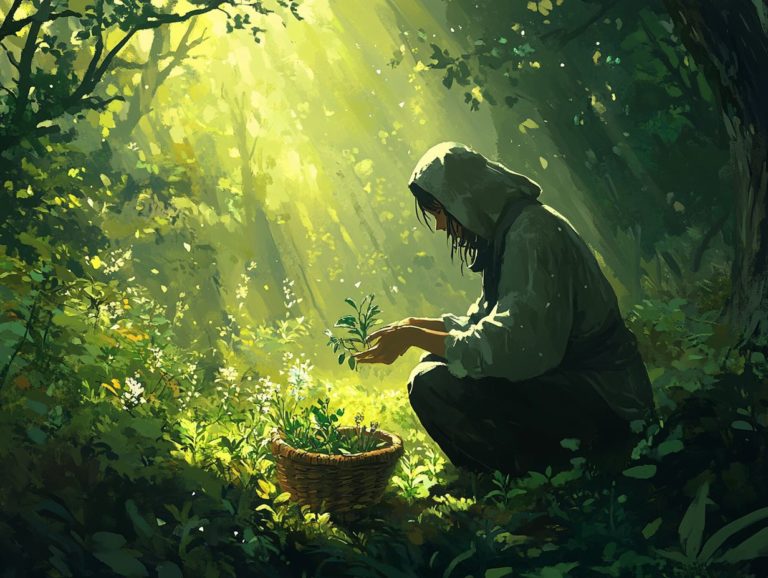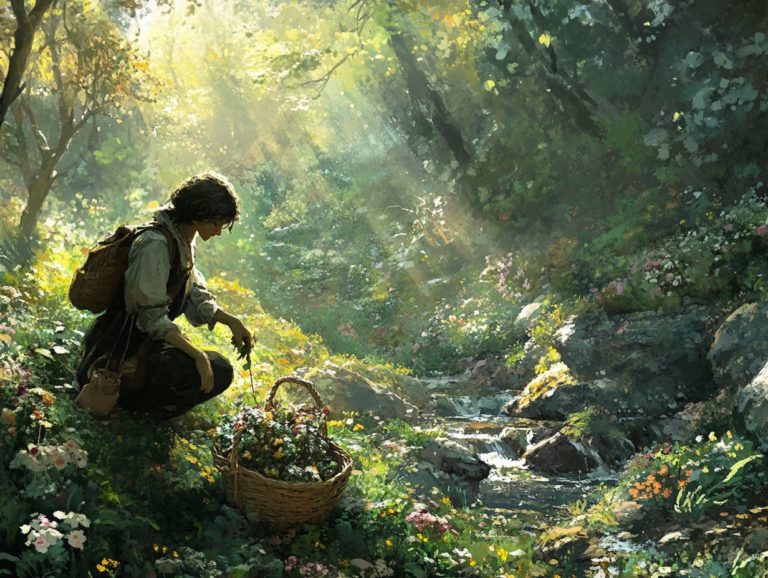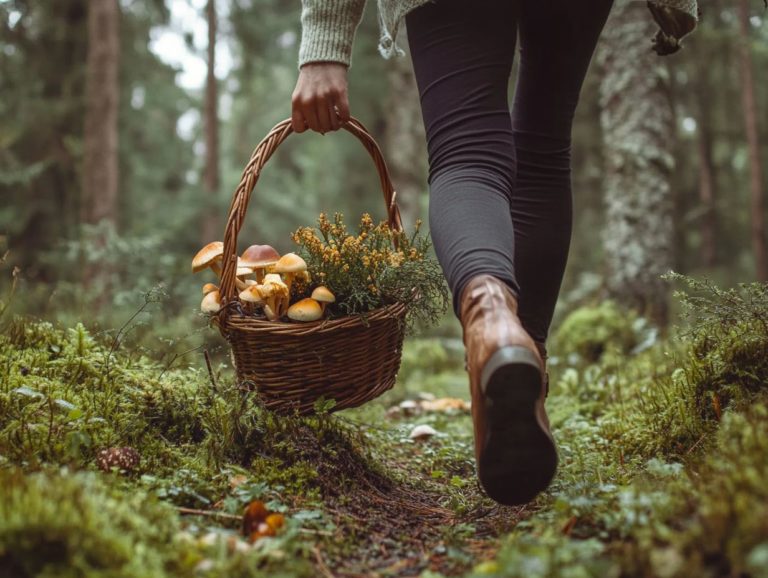Exploring the Ethics of Foraging in Nature
Foraging transcends gathering wild food; it’s a practice rich in tradition, ethics, and environmental awareness. It promotes ethical foraging practices and fosters a connection to nature.
Explore the essence of foraging, uncovering its cultural roots and sustainability benefits. Get ready to uncover the exciting risks you ll want to avoid, including how to discern edible plants from their toxic counterparts.
Essential guidelines for responsible foraging will be laid out, ensuring that your adventures in nature are both ethical and enriching.
Embark on this journey into the fascinating world of foraging and discover the joys of wildcrafting and communal cooking!
Contents
- Key Takeaways:
- The Practice of Foraging
- The Ethics of Foraging
- Benefits of Foraging
- Potential Risks of Foraging
- Responsible Foraging Practices
- Frequently Asked Questions
- Curious about foraging in nature?
- Is foraging ethical?
- What are the potential impacts of foraging on the environment?
- Are there any laws or regulations regarding foraging in nature, especially concerning the collection of wild edibles?
- How can I forage ethically in nature while respecting biodiversity?
- What are some alternative ways to forage in nature, such as wildcrafting?
Key Takeaways:
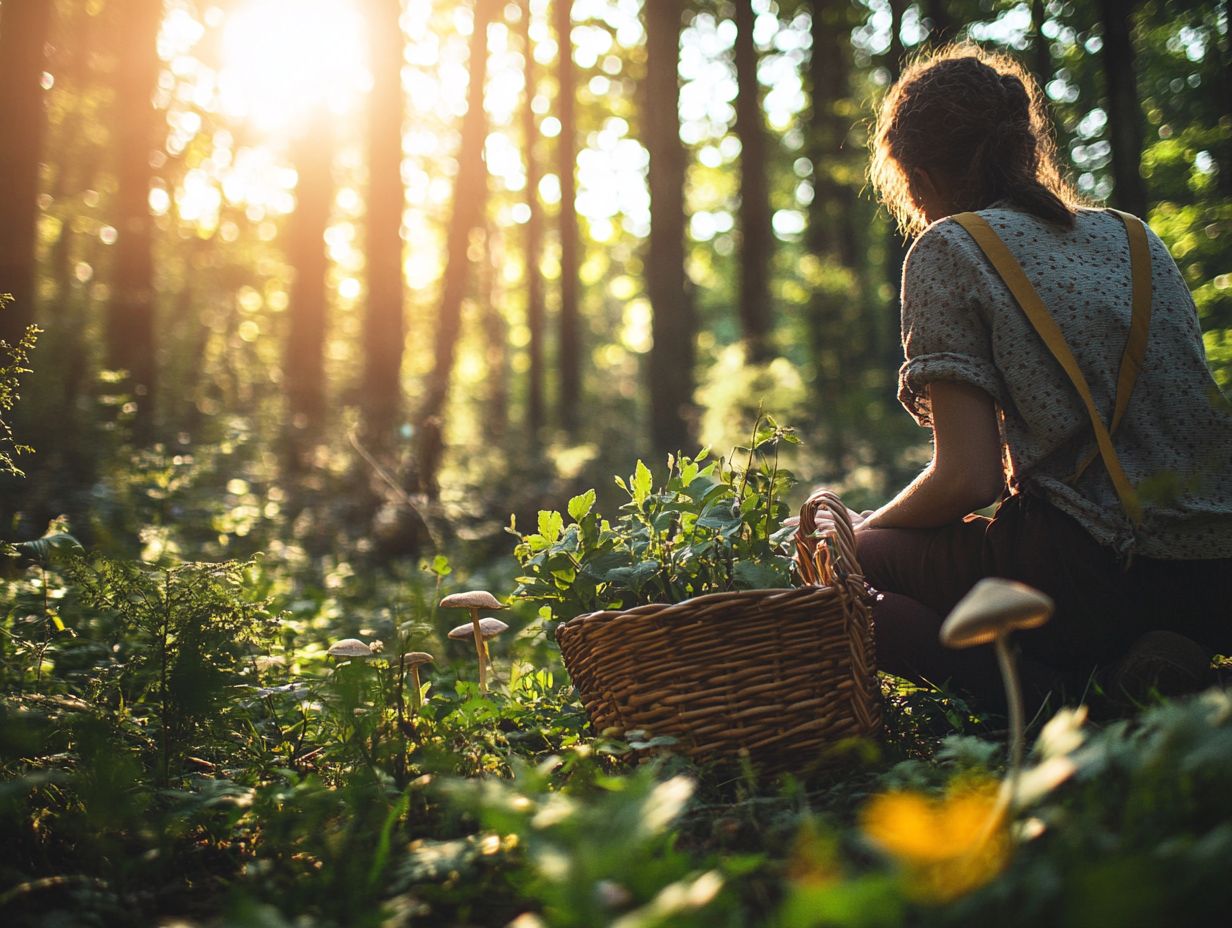
- Foraging is the act of gathering wild plants, mushrooms, and fungi for food, medicine, or cultural purposes.
- The ethics of foraging involve considering the impact on the environment and cultural traditions.
- Practicing responsible foraging helps ensure ethical practices.
The Practice of Foraging
Foraging is a long-standing practice that invites you to gather edible plants, mushrooms, wild greens, and wild food from nature. It forges a deeper connection with the environment while promoting community engagement. This sustainable method of harvesting not only provides valuable food sources but also encourages exploration of local flora, helping you appreciate the significance of the variety of different plants and animals in your ecosystem.
Awareness of food security is growing, and the art of foraging is experiencing a renaissance. It transforms into a culinary adventure that connects you to nature, encourages exploration of the landscape, and fosters a sense of community.
What is Foraging?
Foraging is the art of seeking out and gathering wild food. It encompasses various edible plants, wild mushrooms, and other natural resources that can be sustainably harvested, promoting biodiversity and ecological balance. This practice has been a cornerstone of human survival for millennia, often serving as the primary source of nourishment in ancient societies.
Today, foraging transcends mere subsistence; it has blossomed into a vibrant movement that deepens your connection to nature and local ecosystems, promoting the culinary adventure of wild food culture. Explore the world of foraging and discover a range of wild foods, such as dandelion greens, wild garlic, wild berries, and foraged mushrooms, which often go unnoticed in contemporary diets.
By immersing yourself in the local flora, including wild garlic and nettles, you contribute to community resilience and ecological sustainability. This journey serves as a poignant reminder of the importance of preserving our natural heritage, including the practice of ethical foraging, and the invaluable resources it provides.
The Ethics of Foraging
The ethics of foraging center on responsible practices, including ethical guidelines for foraging that safeguard ecosystem sustainability while fostering environmental awareness and adherence to local regulations.
By following these ethical guidelines, you can play an integral role in preserving plant communities and upholding ecological balance within conservation areas. This thoughtful approach to harvesting, including tips for native and invasive species, not only protects biodiversity but also nurtures a harmonious relationship between you and nature. By using foraging techniques to connect with nature, you can transform foraging into a respectful and enriching experience.
Environmental and Cultural Considerations
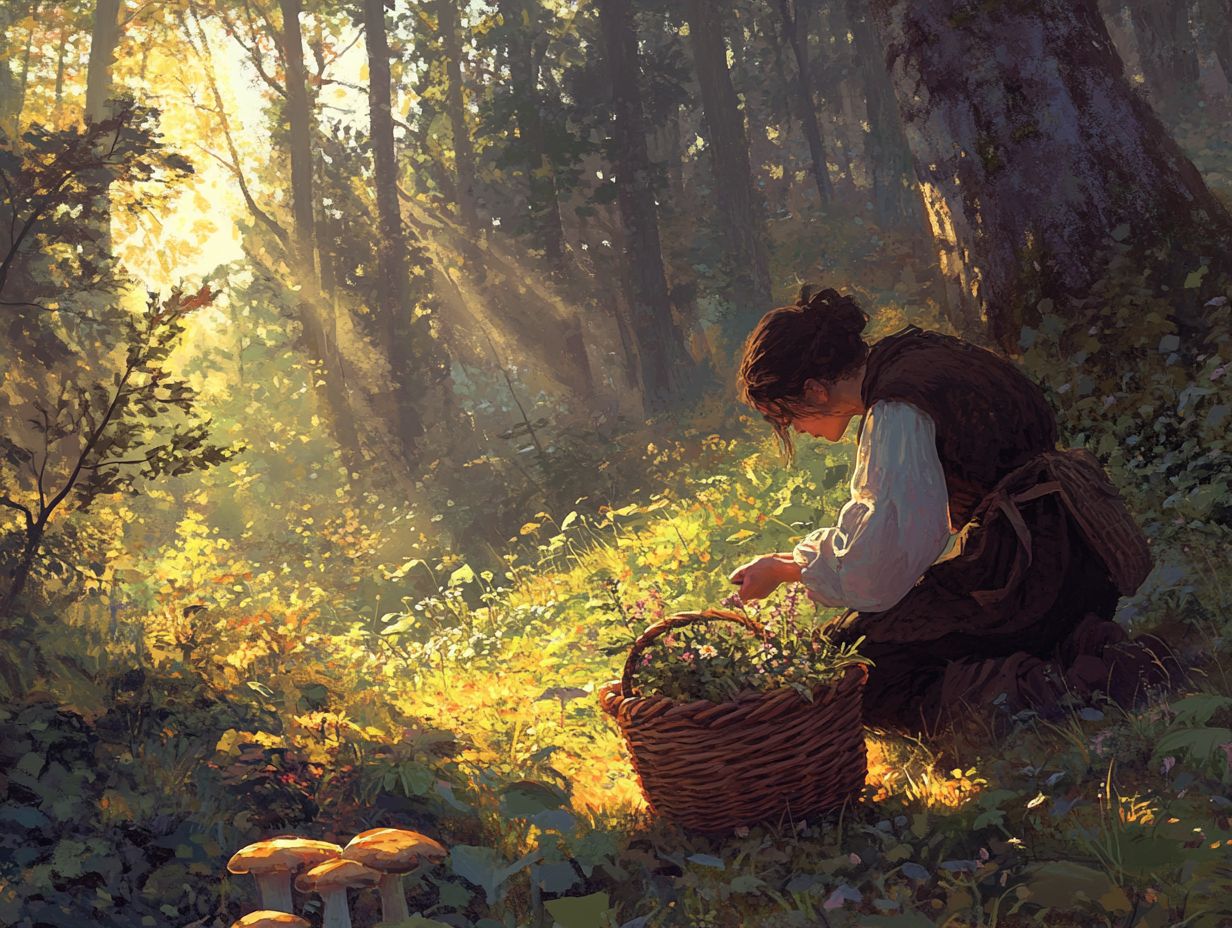
Environmental and cultural considerations are essential in foraging. They shape the practices and knowledge passed down through generations, especially within indigenous communities that have relied on local flora for sustenance.
By understanding and respecting local ecosystems, including conservation areas, you can promote the sustainable use of resources. This also honors the rich cultural narratives that accompany these practices.
Engaging with traditional foraging methods reveals the significance of the variety of plants and animals, as each plays a vital role in maintaining the health of its environment, including wild greens and herbaceous plants.
Being aware of conservation areas, local regulations, and their importance in protecting indigenous knowledge is crucial. This ensures that future generations can continue to learn and thrive, connecting their cultural identities to the landscapes they inhabit.
This mindful approach not only enriches your foraging experience but also fosters a deeper commitment to environmental stewardship. It supports sustainable practices and enhances food awareness.
Benefits of Foraging
The benefits of foraging go well beyond simply gathering wild food. They offer nutritional advantages, promote sustainability, and cultivate a deep connection to nature.
This connection enriches your culinary experiences, including cooking sessions with wild edibles. It also encourages meaningful community engagement.
Nutritional and Sustainability Benefits
Foraging is an exciting adventure that can boost your nutritional intake. Wild edibles, such as wild garlic and blackberries, often boast a richer profile of vitamins and minerals compared to commercially cultivated crops.
This practice introduces an exciting array of flavors and textures to your diet. It elevates your health with food rich in nutrients such as wild garlic, celebrated for its immune-boosting prowess, and blackberries, which are brimming with antioxidants.
Foraging aligns beautifully with sustainable living. It nurtures biodiversity by promoting the growth of native plants, wild cranberries, and ecosystems, while also encouraging organic practices.
This activity serves as a vital source of food security. It allows you to connect more deeply with your environment while reducing reliance on industrial agricultural systems that frequently deplete our natural resources and harm ecological balance.
By embracing nature’s bounty through responsible foraging practices, you nourish yourself with wholesome options. You also play a crucial role in fostering a more resilient food landscape.
Potential Risks of Foraging
Foraging offers a rewarding experience, but you must remain vigilant about potential risks. Be aware of environmental toxins and the dangers posed by toxic plants!
Environmental toxins and the dangers of toxic plants, including specific species of wild mushrooms, pose significant concerns that you should consider carefully.
Identifying and Avoiding Toxic Plants
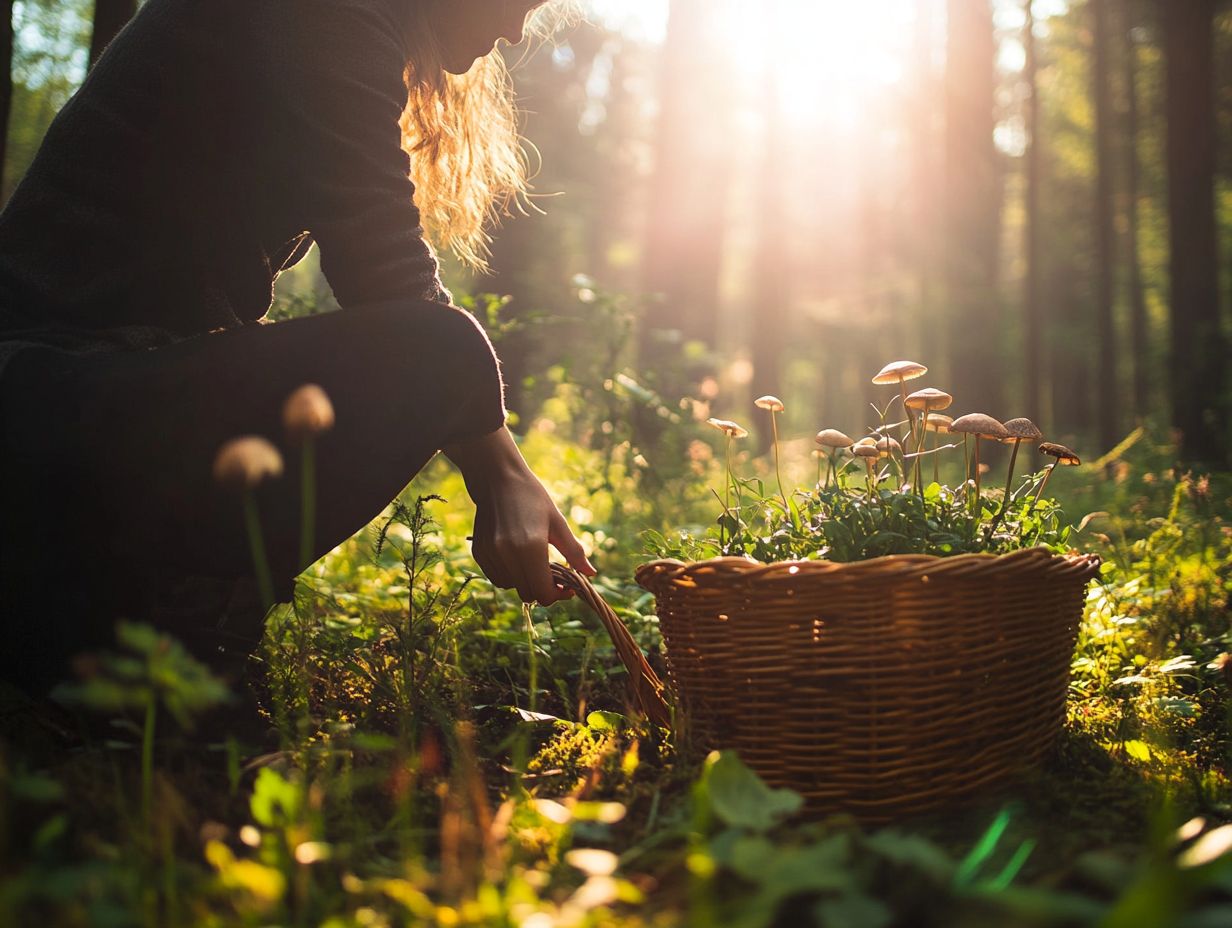
Identifying and avoiding toxic plants is essential for safe foraging practices. This is especially true when recognizing wild mushrooms and other edible plants with look-alikes. Many edible plants, such as nettles and garlic mustard, have look-alikes that can be dangerously deceptive, posing serious health risks if misidentified.
You should familiarize yourself with the distinguishing characteristics of common toxic species, like the infamous poison hemlock, wild mushrooms, and deadly nightshade. These can easily be confused with harmless varieties. Developing keen observational skills is vital; pay attention to unique leaf shapes, flower structures, growth habits, and the various plant habitats around you.
Relying on trustworthy field guides, foraging tours, or mobile apps can significantly assist in your identification process. Such resources provide clear photographs and detailed descriptions for comparison.
Joining local foraging groups, workshops, or cooking sessions can amplify both your knowledge and confidence in foraging practices. For anyone interested in wild edibles, equip yourself now with the best resources for a safe and thrilling foraging adventure!
Responsible Foraging Practices
Embracing responsible foraging practices that incorporate ethical guidelines is crucial. This helps maintain the sustainability of ecosystems and ensures the ongoing availability of wild food sources. It’s important to prioritize ethical guidelines, including local regulations, and consider promoting ethical foraging in your community by adopting mindful harvesting techniques. This allows you to enjoy nature’s bounty while preserving it for future generations.
Guidelines for Sustainable and Ethical Foraging
Guidelines for sustainable and ethical foraging underscore the necessity of respecting local regulations, understanding biodiversity, and employing effective harvesting techniques. For more insights, check out understanding foraging etiquette, as these practices are essential for maintaining ecological balance while promoting nature preservation.
Such practices safeguard the environment and enable you to make a positive contribution to your local ecosystems. By participating in community engagement and awareness, you can navigate potential legal pitfalls and act responsibly while adhering to foraging techniques in responsible living.
Engaging with community groups can offer invaluable insights, deepening your understanding of sustainable practices and the importance of food awareness. Share your experiences and knowledge with others through workshops and cooking sessions. This fosters a supportive network that cherishes the stewardship of natural resources.
Remember, mindful foraging helps you connect with nature and ensures future generations can enjoy its bounties too!
Frequently Asked Questions
Curious about foraging in nature?

Foraging in nature refers to the act of gathering and collecting wild plants, fruits, nuts, and other natural resources, including wild edibles, for food or medicinal purposes.
Is foraging ethical?
The ethics of foraging in nature is a complex and debated topic. It involves balancing environmental awareness with the benefits of wild food culture. Some argue that foraging is a sustainable and respectful way to interact with the environment, while others believe it can harm ecosystems and disrupt natural balance. This highlights the importance of mastering the art of ethical foraging to ensure responsible practices.
What are the potential impacts of foraging on the environment?
Foraging can have both positive and negative impacts on the environment, particularly concerning biodiversity and the conservation of plant communities. On one hand, it can promote diversity, support community engagement, and reduce food waste. On the other hand, if not done responsibly, it can disrupt plant growth, harm animal habitats, and lead to ecological imbalance.
Are there any laws or regulations regarding foraging in nature, especially concerning the collection of wild edibles?
Yes, many areas have laws and regulations regarding foraging in nature. These rules include the collection of edible plants and mushrooms.
Research and follow these regulations to ensure ethical and sustainable foraging practices.
How can I forage ethically in nature while respecting biodiversity?
To forage ethically, research the edible plants in your area and understand the role of conservation in wild foraging. Only take what you need and leave enough for nature to thrive.
Always respect the environment and its creatures to keep the ecosystem balanced.
What are some alternative ways to forage in nature, such as wildcrafting?
When foraging isn t allowed, you can still gather natural resources. Join organized foraging tours, participate in communal cooking sessions, or buy sustainably sourced wild foods from local farmers and markets.

